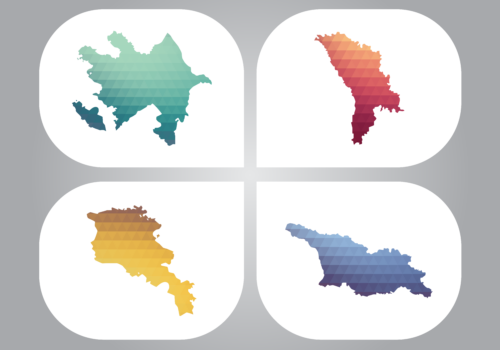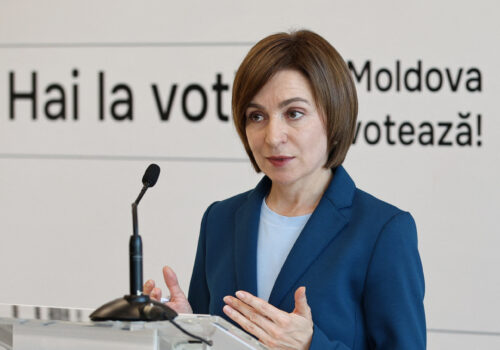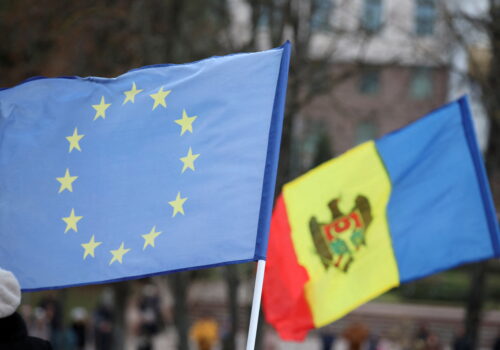Russia is directly and indirectly meddling in Georgia’s upcoming election
On the morning of October 24, officials from the Investigative Service of Georgia’s Ministry of Finance raided the homes of two staff members of the Atlantic Council’s Digital Forensic Research Lab in Tbilisi, Georgia. One of the two, Eto Buziashvili, had published a dispatch from Tbilisi just a day earlier detailing the many ways Russia is meddling in an upcoming election that could, as Buziashvili notes, “determine Georgia’s future.” Read her story below and the Atlantic Council’s statement on the home raids here.
On October 26, Georgians will face a pivotal decision as they vote in their parliamentary elections, which could carry existential consequences for the country’s future. Voters will choose between a pro-Western political opposition and the anti-Western, Kremlin-friendly ruling Georgian Dream party.
It’s a decision that could determine Georgia’s future. Either Georgia cements itself in Russia’s orbit—where it already is—or escapes it and returns to a Western path. Two main factors are pressing against a return to a Western path: Russia is influencing Georgian politics with its support for Georgian Dream, and it’s interfering in the upcoming elections in more direct ways, too.
What Georgians want
Russia’s influence and interference in Georgia isn’t new; it’s longstanding and multifaceted, involving hybrid operations, direct military intervention in August 2008, and the ongoing occupation of South Ossetia and Abkhazia. But for many years, Moscow relied on marginal, openly pro-Russian political actors in Georgia to undermine the country’s Euro-Atlantic aspirations. Since Russia’s full-scale invasion of Ukraine in February 2022, however, a deeper, more insidious alignment has come to light: Georgian Dream has increasingly revealed itself as essentially a Kremlin proxy, obstructing Georgia’s integration with Euro-Atlantic institutions.
Ask most Georgians what they prefer, and the answer will be clear. According to polling, strong majorities of Georgians support their country’s integration into the European Union (EU) and NATO. Combined with Georgians’ general commitment to democratic values and defending freedom, a fair question has arisen: If Georgians are pro-Western, then how has Georgian Dream maintained power since 2012? Because being openly anti-Western and pro-Russian would likely lead to political isolation, Georgian Dream has sought to present itself as a pro-democracy, pro-Western party, against mounting evidence to the contrary.
Since 2012, Georgian Dream’s election campaigns have been built on promises of bringing Georgia closer to the EU. Even today, despite unprecedented attacks on the West, Georgian Dream’s election banners display EU flags and pledge EU integration, perpetuating a façade to maintain public support. In practice, however, the party has distanced itself from a pro-EU agenda.
Another detail to consider is Georgian Dream’s portrayal of Viktor Orbán’s Hungary as a model for Georgia’s European future. Orbán is an increasingly authoritarian leader who has systematically undermined democracy at home while challenging democratic values across the EU. Georgia’s ruling party has framed him as the face of Europe that Georgia should aspire to, presenting Orbán’s fight for “traditional, Christian, conservative, family values” as an important struggle against the EU’s “LGBTQ+ propaganda.”
Over the past decade, under the false promise of drawing closer to the EU, Georgia has taken a turn from being a “beacon of democracy” to sliding toward authoritarianism. The country now suffers from a captured judiciary and institutions, with laws increasingly targeting media and civil society and widespread violations of human rights. When Western countries began to implement measures to isolate Russia in response to its full-scale invasion of Ukraine, Georgian Dream tightened its relations with Russia. The Georgian Dream party and some current and former government officials have faced sanctions from the West for undermining democracy and acting as agents of the Russian intelligence service “to influence Georgian society and politics for the benefit of Russia.”
In this context, unlike in Moldova, where Russia has launched a massive covert influence campaign to sway elections, in Georgia the Kremlin relies heavily on the Georgian Dream-led government to undermine the country’s pro-Western aspirations. Georgian Dream has effectively taken on much of Russia’s work, steering the country away from Euro-Atlantic integration. The central theme in Georgian Dream’s election campaign this year has been accusing the West of causing Georgia’s and the wider region’s troubles, while portraying Russia as a guarantor of peace—a narrative also heavily pushed by the Kremlin.
Georgia’s ruling party: Doing Russia’s work from within
The West-blaming rhetoric intensified in early 2024 when Georgian Dream reintroduced and passed a Russian-style foreign agents law, a piece of legislation the EU condemned as “incompatible with EU values and standards.” The law was passed to target Western-funded nongovernmental and media organizations, labeling them as foreign agents. This move suppresses civil society and lays the foundation for a stronger anti-Western narrative in the country.
The anti-Western narrative deployed by Georgian Dream includes three major narratives designed to manipulate and influence voters.
Narrative 1: The West is dragging Georgia into war, but Georgian Dream pushes back to maintain peace.
The ruling party introduced this narrative shortly after Russia’s full-scale invasion of Ukraine, with Georgian Dream blaming the war on Ukraine and its Western allies. The ruling party has framed the West as a “global war party” that is trying to open a “second [war] front” in Georgia along with Ukraine. In doing so, the ruling party presented voters with a false choice: peace with Russia under Georgian Dream or war brought by the West. This message escalated on September 26, when the party installed banners in Tbilisi comparing bombed-out Ukrainian cities with “peaceful” Georgian cities.
Narrative 2: The United States is organizing protests on election day to overthrow Georgian Dream.
To preemptively delegitimize any protests that may arise in response to perceived electoral fraud, the ruling party claims that the United States is orchestrating demonstrations on election day. By framing any genuine, pro-democracy protests as part of a Western-backed coup or attempted revolution, Georgian Dream aims to discredit these movements and justify any potential crackdowns. This echoes long-standing Russian narratives that portray Western governments as organizers of coups and revolutions—a Kremlin tactic used to discredit democracy protests globally.
Narrative 3: Georgian Dream can make a deal with Russia to recover Russian-occupied Georgian regions.
This narrative suggests that it was not Russia but rather Georgia’s previous ruling party—with Western backing—that initiated the 2008 war against Russia. Georgian Dream implies that its deepening relations with Moscow will yield tangible results, such as the reintegration of Georgia’s occupied regions—but only if the party secures overwhelming support in the upcoming elections. In September, the founder of Georgian Dream, Bidzina Ivanishvili, even suggested that Georgians should apologize for starting the 2008 war.
Georgian Dream also appears to have promoted these narratives in a covert way to mislead Georgian citizens. In early 2023, for example, Facebook’s parent company, Meta, removed a network of hundreds of Facebook assets linked to the Georgian Dream-led government. Nor is this the first time Meta has exposed and deplatformed such efforts by the party to deceive voters.
Russia’s direct meddling
Russia has not just relied on Georgian Dream to carry its message in the country. It has also engaged in various direct attempts to interfere in the upcoming elections. For example, Russia’s Foreign Intelligence Service (SVR) has issued several statements accusing the United States of orchestrating a coup to overthrow Georgian Dream. In the past few months, at least four statements from the SVR have claimed that the United States is staging a “Hollywood-style” plot to incite civil unrest and remove the ruling party from power through a “Tbilisi Maidan,” a reference to Ukraine’s 2013-14 uprising. The SVR also added that Russia wants to thwart attempts of a “color revolution” in Georgia by disclosing the available information on this issue.
In August, Meta removed a Russia-originated network targeting Georgia that was actively posting about the protests against the Russian-style foreign agents law. This network criticized the protesters while expressing support for Georgian Dream. The operation, which centered around fictitious news websites, also extended across various platforms. Russian actors sought to blur the line between authentic political discourse and manipulated narratives, distorting public perception and making it challenging for Georgians to differentiate between genuine public sentiment and narratives injected into online discourse by foreign actors.
Russian intelligence has also operated assets on Georgian Telegram, including a channel dedicated to promoting the narrative of an upcoming Western-organized “coup” during the elections. This channel is run by NewsFront, a Russian disinformation platform linked to Russian intelligence services that operates in multiple languages.
The upcoming elections are pivotal for Georgia. Just six days before the vote, Georgians took to the streets of Tbilisi in a march titled “Georgia Chooses EU,” signaling a strong support for Western integration. Today, voters appear to be more aware than in previous elections about the intentions of the ruling party and Russia’s desire to maintain influence in the country. But it is the upcoming election results that will reveal whether Moscow’s influence campaign will leave a lasting mark on Georgia’s political future or if the nation might manage to follow its true dream of Western integration.
Eto Buziashvili is a research associate focusing on Eastern Europe and Russia at the Atlantic Council’s Digital Forensic Research Lab (DFRLab).
Further reading
Thu, Oct 17, 2024
Information warfare in the South Caucasus and Moldova
Report By
The four countries that are the focus of this report— Armenia, Azerbaijan, Georgia, and Moldova—navigate a complex geopolitical landscape. This complexity is reflected in their information spaces. Their collective legacy bears the indelible imprint of Soviet imperialistic rule, yet each is marked by a distinct identity and national trajectory that defy collective generalizations as mere […]
Mon, Oct 21, 2024
Five questions (and expert answers) about Moldova’s elections
New Atlanticist By
Moldova narrowly voted to add the goal of EU membership to its constitution, and pro-Western President Maia Sandu advanced to a runoff. Our experts interpret the results and preview what's coming next.
Fri, Oct 11, 2024
Dispatch from Moldova: With elections approaching, Moscow is taking aim at Chișinău’s pro-European path
New Atlanticist By Shelby Magid
Russian influence campaigns are working to sway votes ahead of the October 20 election, which will include a referendum on enshrining EU membership as a goal in Moldova’s constitution.
Image: A drone view shows election billboards of the ruling Georgian Dream party, one of which depicts a devastated Ukrainian city contrasted against a peaceful Georgian one, in Tbilisi, Georgia September 27, 2024. REUTERS/Irakli Gedenidze


